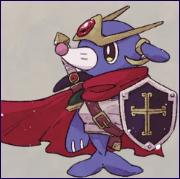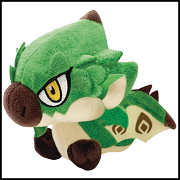|
Leperflesh posted:From a game theorycrafting standpoint, what are the alternatives to rolling dice to discover the outcome of a character using a skill? Gumshoe does this, and in my limited experience it sort of just kicks the problem down the road because you spend your points until they're gone then you're suddenly a bit useless
|
|
|
|

|
| # ? May 25, 2024 16:13 |
|
Leperflesh posted:From a game theorycrafting standpoint, what are the alternatives to rolling dice to discover the outcome of a character using a skill? You could, theoretically, base something off mechanics from other games, such as rock-paper-sissors or worker placement games.
|
|
|
|
Haystack posted:You could, theoretically, base something off mechanics from other games, such as rock-paper-sissors or worker placement games. Integrate mancala into the character sheet.
|
|
|
|
The potential issue (or possibly upside) to using games as a way of determining success is suddenly player skill becomes very important. I think part of the appeal of dice is that they're unbiased, as much as our fun table superstitions say otherwise. Obviously chargen can be a skill (again, either as a blessing or curse) but I think most modern designs either try to do awsy with those imbalances or make good choices way more obvious - and worst case you just copy the stats of someone else's character from a forum post. Now if we have to play a hand of poker or manage a player tableau it becomes much more likely that someone can be Bad At Roleplaying. Which again, isn't inherently bad, but is worth noting.
|
|
|
|
I guess what I meant by "rolling dice" is any form of RNG, although cards has the distinction of removing possible outcomes from the set, if you have a deck that doesn't get reshuffled after each draw. GM Fiat is an interesting intersection - the GM in most "beat x difficulty" systems is setting x by fiat already, but if the player then rolls dice or spends resources, the GM isn't deciding the definite outcome by fiat* I suppose I'm interested in codification of trained or learned character capacity in ways that doesn't boil down to a list of game-relevant things the character can attempt, and they're precisely X good at each one, and X is a variable that plugs into a mechanic that involves dice or dice pools or target numbers etc. PDQ has a system of named abilities which have a halo effect: if my character has "Mad Scientist [+4]", I can assert that in a scene where some skill is required that would fit within the realm of "being a mad scientist" is a skill my character gets +4 at trying, and if the GM agrees, then it is so. This is still a "skill-having? then modifier" type mechanic, but it doesn't involve the game dictating a list of specific game-relevant skills that everything has to be shoehorned into. sebmojo posted:Gumshoe does this, and in my limited experience it sort of just kicks the problem down the road because you spend your points until they're gone then you're suddenly a bit useless Spendable resources need to have some way to recharge, and if that way is too inflexible/infrequent, then this happens, and players will try to avoid it via metagame decisions if the have to. Most familiar being the good ol' "time for a long rest so we can recharge spell slots" trope. I like the 2d20 mechanic, which you'll be familiar with from our conan game: you can use Momentum from the party pool, but if it's out, you can still get more (with no limit) by adding Doom to the GM's pool, so instead of a hard limit, it's just a push-your-luck system of tradeoffs. There's a ton of GM fiat and wiggle room in that system, though, and a certain amount of ambiguity too (GM doesn't spend Doom on things that they built into the scene from the start, and they could have built an easy or a difficult scene, so being able to spend Doom to add more difficulty to the scene can feel weird; but there are guidelines for default scene difficulty, it's not totally pulled from one's rear end, and overall the system does seem to work, more or less!) *we'll ignore the whole "GM can lie about whether that roll succeeded or failed" bit for the sake of sanity
|
|
|
|
A bidding game between the player(s) and GM would be both unpredictable and non-random. That said, I think one advantage of the player rolling against a fixed DC, as opposed to some kind of opposed contest, is that the player feels as though they are fighting against the system, while the GM is just a meditating 3rd party. If the player and the GM make an opposed roll or contest, then it sells the idea that the players and GM are in direct opposition, which may or may not be the desired effect.
|
|
|
|
A bidding game sounds interesting. I suppose it would have to set a hard limit on the resources the GM has to bid with, and that's something that feels like it's missing in a lot of RPGs - the tradition has been the GM has total freedom to put whatever they want into play, with merely guidelines about how to balance difficulty (Encounter Rating, for example) rather than some inviolable rule. One could limit the scope, though; a given antagonist has five biddable resources to use in a conflict, the PC has five, etc. GM can still decide when to place an antagonist and how much biddable things they've got, but players can regard each encounter as "fair" because the GM doesn't get to sneak in extra resources by fiat if things don't go how they anticipated.
|
|
|
|
I remember Insylum ran almost entirely on a bidding game, but it was really really bad because it was so simplistic. You really only have one pool of points to spend in conflicts; your hit points are also your experience points.
|
|
|
|
Tuxedo Catfish posted:I have not! Did I unknowingly describe it?
|
|
|
|
Leperflesh posted:From a game theorycrafting standpoint, what are the alternatives to rolling dice to discover the outcome of a character using a skill? I have a soft spot for the Polaris: Chivalric Tragedy system of ritualized lawyerly bargaining.
|
|
|
|
Resource bidding can show up in Gumshoe, and also in GODLIKE (and possibly other One Roll Engine games which I haven't played). The players have a skill currency or metacurrency they can spend in an opposed roll/"battle of wills", and so does the NPC. The problem lies in the different relative values of points to the players and NPCs. The players need to budget their points across an entire campaign, or at least until the next opportunity to refresh their points. Whereas the NPC only needs to spend resources in that given scene. The NPC won't be caught offguard later if they blow their resources fighting the players, because their actions after the conflict is over (assuming they even survive) won't be simulated in detail. Some games do a lesser version of this by giving important NPCs a small amount of the same narrative metacurrency as the players. Though I think this is less for bidding and more to hedge against sudden conflict ending outcomes - you can burn a Fate point to stop the boss from being shot in the head and killed on the first turn.
|
|
|
|
Leperflesh posted:From a game theorycrafting standpoint, what are the alternatives to rolling dice to discover the outcome of a character using a skill? Well there's the well-known feature of Dread, where you've got a short list of skills you can do well under pressure, and anything outside of that will require pulling and placing a Jenga block. I'd love to see more games use something like a Poker hand for task resolution. I think it's fun to see TTRPGs experiment with integrating other games into their systems.
|
|
|
|
Leperflesh posted:From a game theorycrafting standpoint, what are the alternatives to rolling dice to discover the outcome of a character using a skill? There's one I've been trying to make work for PnP games for some years now, basically adapting something similar to Robo Rally's system for resolving moves. I.e., you have a limited selection of outcomes/keywords that you draw, and then you stitch that together into the situation that you want. So something always happens, and you have a say in what that something is, but your options are limited, lightly randomized and you may have to compromise. Because success is almost always more interesting than failure, yet constant success without any tension from the possibility of consequences and failure easily gets boring. Though I guess that's still RNG-related.
|
|
|
|
skill checks instead of having DCs to beat are resolved by number of jenga blocks per "conflict tower" you must remove. like clocks each individual challenge has its own conflict tower meaning as time goes on checks become harder
|
|
|
|
PurpleXVI posted:There's one I've been trying to make work for PnP games for some years now, basically adapting something similar to Robo Rally's system for resolving moves. I love robo rally, and that sounds like a really cool idea. In robo rally, damage to your robot reduces your hand size, and when it reaches the minimum, you start to have cards "locked in place" from turn to turn, so you effectively begin to lose control of your robot. I suppose you could straight up treat character injury the same way, but that might be a bit weird? My swordsman is so hurt that now he always starts each round with a shield bash? Oh he took an arrow to the knee, now it's a shield bash followed by a sidestep, just can't think to do anything else because of the pain in that knee... But maybe that's too granular anyway, and it's more like cards that say "aggress" or "defend" or "avoid" etc.? Or even higher level, "try to fight" vs, "try to negotiate" vs "try to intimidate" and if you're under enough stress, you're just falling back to your instinct/baseline character motivation/whatever...
|
|
|
|
PurpleXVI posted:I.e., you have a limited selection of outcomes/keywords that you draw, and then you stitch that together into the situation that you want. So something always happens, and you have a say in what that something is, but your options are limited, lightly randomized and you may have to compromise. That's similar to the actual system suggested in Weather The Cuckoo Likes. Possibly Everway too?
|
|
|
|
pog boyfriend posted:skill checks instead of having DCs to beat are resolved by number of jenga blocks per "conflict tower" you must remove. like clocks each individual challenge has its own conflict tower meaning as time goes on checks become harder This is an actual thing in the Dread RPG, wherein every time you attempt something risky / as dictated by the horror genre you're in, you remove one or more Jenga blocks from a tower. If the tower falls, your character dies. If you choose to knock over the tower, you die, but gain powerful narrative control over the scene to ensure that your death matters for the survivors. Dread rules, everyone play Dread.
|
|
|
|
I know that Fate of the Norns does... something with rune tokens instead of dice, but I have no idea what exactly. The review I'm reading doesn't clarify a lot, but makes it sound interesting. quote:In this RPG there is a play mat, and depending on where those runes end up, different things occur. If you know comp sci or math, think of it as a state machine. If you’re more artistic, think of it as telling a story depending on how the runes move on your personal play mat.
|
|
|
|
mellonbread posted:This is key. If the goal is to make results more predictable and avoid outlier results that make everyone miserable (the primary reason people suggest using normally distributed dice systems) then the real question isn't what dice to use, but whether to roll at all. Spock is scanning a planet for lifeforms. This is a difficulty 0 check, so the player can either Just Do It, or choose to roll. It's the start of the session and the player wants to bank some momentum (metacurrency), and also just wants to let some dice hit the table because c'mon. They roll their 2d20 and get two successes, meaning two momentum in the bank. Noice. In the next scene they're trying to get the Vulcan Science Council to explain the subterranean lab full of Vulcans they just scanned. The GM decides this is difficulty 1. Spock's player says hey, I have the trait Vulcan, would that reduce the difficulty? The GM says sure, that's d0. Spock's player again decides to roll the dice and gets 5 and a 20. Ouch, that's a consequence. The Vulcan Science Council, under strict conditions of confidentiality, sends on the requested information. A momentum gets banked for the 5 and the GM banks two threat because she can't think of any decent consequences that won't stymie the story or interfere with the auto-success nature of the task. Later they're trying to attempt entry into the lab. Bypassing a door panel is something Scotty can do in his sleep, so it's again a pretty straightforward d0. Scotty chooses to roll anyway and rolls a 10 and a 20. A consequence! The door rolls open, but Scotty is launched across the room by an electric shock! Their player chooses to have him beam back up to the ship to be treated in sickbay and takes over Ensign Tempman for the next few scenes. So the characters are explicitly competent; Spock is never at risk of failing a straightforward scan and Scotty is never at risk of failing to pull a lever, but the players can choose to gamble for side-bets if they feel the dice aren't hitting the table enough for their liking. And you can have multiple different kinds of players at the same table; Spock's player likes to roll whenever possible, but Kirk's player might choose to just take the easy win every time, and neither is at an advantage or disadvantage, mechanically or narratively.
|
|
|
|
One criticism I have of this system is that a 5% chance per die rolled of a consequence is sufficiently low, consequences are both interesting and sufficiently low-impact, and momentum is sufficiently good, that IMO it's always worth rolling. But if a person was so inclined, they could tweak that by for example having consequence on a 19-20 (as is the case for sorcery in Conan...).
|
|
|
|
In the 2D20 Dune, Difficulty 0 tests can also be used to gather Momentum in battle. The "Observe" action is DC 0 by default, so any successes you get with your perception roll can be converted directly to Momentum. So if you're willing to spend your action "doing nothing" you can quickly fill up the pool for your teammates to spend. It feels a little like a JRPG battle, where characters have restorative abilities that refill the team's mana or special powers.
|
|
|
|
Absurd Alhazred posted:There's also the potentially hidden power level, which is kind of like the first alternative you mentioned, except you don't always know what the other contestant's power level is before committing to an attempt. (See Amber Diceless). Under no circumstance should you actually try to use Amber Diceless as any form of non-negative example. hyphz posted:That's similar to the actual system suggested in Weather The Cuckoo Likes. Possibly Everway too? Nah, Everway uses goofy poo poo for character creation (look at five pictures and describe how they're your character!) but the actual mechanics of the game are a 1D10 roll over (or under, it's been a minute).
|
|
|
|
theironjef posted:Under no circumstance should you actually try to use Amber Diceless as any form of non-negative example. I had a blast playing it at a convention, but I've heard from multiple people that they're not running it by the book, which mostly showed. Also it seems like the play culture revolves around being waayyyyy too into the setting, and no, just having read the books through a few times doesn't count.
|
|
|
|
lightrook posted:A bidding game between the player(s) and GM would be both unpredictable and non-random.
|
|
|
|
Haystack posted:I know that Fate of the Norns does... something with rune tokens instead of dice, but I have no idea what exactly. The review I'm reading doesn't clarify a lot, but makes it sound interesting. I played it with the designer at a con and still couldn't tell you exactly how it worked.
|
|
|
|
It's doing a thing I don't see often, but it's always worthy of note when I do, which is "Power has one paragraph of what it does and how it works and five paragraphs for the DM about how they should stop it from working as intended and punish anyone who tries to use it."
|
|
|
|
theironjef posted:It's doing a thing I don't see often, but it's always worthy of note when I do, which is "Power has one paragraph of what it does and how it works and five paragraphs for the DM about how they should stop it from working as intended and punish anyone who tries to use it." It's also an early instance of the unsolicited emotional trauma infliction confession genre, now more associated with John Wick.
|
|
|
|
Castle Falkenstein's card system is pretty great
|
|
|
|
hyphz posted:There is a halfway point between the two, which I think was used by the old Conspiracy X, where skill rating is compared to difficulty, and if it's within a certain margin then a dice roll against a standard probability is required to succeed. This tends to be closer to how people think their skills work - most people can divide tasks into "I can easily do that", "That'll be a lot of work/effort", "I might not manage that" and "No chance". But that creates problems with hard boundary numbers. The big problem is that, as mellonbread said, for a lot of players less rolls feels like less gameplay. This solves some of that because you're still going through the theater of "hmm... what's your natural success level? Oh wow that just works well done". The dice didn't hit the table but a certain mathy dicelike feel did, and certain categories of players won't get that feeling that the GM is "going easy on them". This won't cut it for everyone though, and the modiphius solution needs a system with much more resolution width than native d20 provides.
|
|
|
|
Leperflesh posted:I love robo rally, and that sounds like a really cool idea. In robo rally, damage to your robot reduces your hand size, and when it reaches the minimum, you start to have cards "locked in place" from turn to turn, so you effectively begin to lose control of your robot. I suppose you could straight up treat character injury the same way, but that might be a bit weird? My swordsman is so hurt that now he always starts each round with a shield bash? Oh he took an arrow to the knee, now it's a shield bash followed by a sidestep, just can't think to do anything else because of the pain in that knee... I think that, yeah, you'd need to have the cards more abstract, like perhaps they'd be stuff like: "violence with" and then you'd slot in perhaps "property damage"(does your attack collapse the roof?), "lost equipment"(your sword breaks when you hit the guy) or "injured ally"(your wild spray of gunfire wings a friend). Perhaps each card would have a prefix and a suffix on it, so you'd never have a hand you couldn't use. Additionally, I was thinking hands wouldn't refresh until "exhausted"(perhaps some options to refresh a hand at the cost of maximum hand size?) so that if you started off by playing card combos that didn't have any drawbacks, you'd paint yourself into a corner of having some successes with but's attached in situations where you might be less willing to accept them. If you were doing stuff with clear, defined moves, I think you'd need to specifically have a format like 4E D&D where it's very much tied to a board game and probably the central/main mechanic is combat. You're bumping into some of the same issues I've had trying to turn it into an actual system since I thought of it.
|
|
|
|
Absurd Alhazred posted:It's also an early instance of the unsolicited emotional trauma infliction confession genre, now more associated with John Wick. explain
|
|
|
|
Leraika posted:explain Both Amber Diceless and John Wick's Playing Dirty contain several accounts of them emotionally manipulating and torturing their players.
|
|
|
|
theironjef posted:Nah, Everway uses goofy poo poo for character creation (look at five pictures and describe how they're your character!) but the actual mechanics of the game are a 1D10 roll over (or under, it's been a minute). Don’t forget the Fortune Deck! That is the true spirit of Everway to me, the GM responding to PC action by making a pseudo-Tarot draw and just kind of following the vibes. That said, Everway had like three or four different suggested resolution mechanics, another of which was just “directly compare stat rating to a suggested difficulty” which may have been a hat-tip to Amber.
|
|
|
|
Absurd Alhazred posted:Both Amber Diceless and John Wick's Playing Dirty contain several accounts of them emotionally manipulating and torturing their players. ohhhh I thought you meant the rune game. Okay yes this makes a great deal of sense, thank you.
|
|
|
|
Is this thread retreading the distinction between Fortune (roll a die or other randomiser), Karma (spend points or compare scores) and Drama (GM or other players determine things)? Go search those terms up if you want to read RPG theory stuff on it two decades old.
|
|
|
|
mellonbread posted:It's easy to dismiss the tactile pleasure of rolling handfuls of dice as "lesser" than enjoying well designed mechanics, but I can't just write it off. I've bought hardcopy books and box copies of games that I have zero expectation of ever playing at a physical table, and the underlying impulse to do so was basically the same. I think it's also the same reason why people still play wargames at physical tables when the rules for the most popular games a) aren't that good and b) could easily be replicated on a computer for a fraction of the cost: assembling and painting the playing pieces, and getting to move the finished pieces around a table with miniature terrain, is the actual important part of the experience. Thankfully I can't, which saves me a ton of money in FNM entries.  One thing that really helped me with dealing with randomness was simply slowly training to accept that I can't do anything about bad draws in Magic. When the deck is shuffled, all I can do is play the hands I draw and just do my best to not fumble too hard. This has slowly crept all over my gaming hobbies so I've just stopped getting the rush from the click-clacks and become the EV-gaming robot I am today. Countblanc posted:The potential issue (or possibly upside) to using games as a way of determining success is suddenly player skill becomes very important. I think part of the appeal of dice is that they're unbiased, as much as our fun table superstitions say otherwise. Obviously chargen can be a skill (again, either as a blessing or curse) but I think most modern designs either try to do awsy with those imbalances or make good choices way more obvious - and worst case you just copy the stats of someone else's character from a forum post. Now if we have to play a hand of poker or manage a player tableau it becomes much more likely that someone can be Bad At Roleplaying. Which again, isn't inherently bad, but is worth noting. D&D has become a game where I do a lot of arithmetic just so I can say I play an Elf Barbarian What Flies, and I'm starting to think I either need to convert my group to Fate just to save time, or play old bad games where being Bad At Roleplaying has consequences and characters die when you don't put 80% in Dodge (Ancient Marine Humanoids). Siivola fucked around with this message at 07:34 on Mar 30, 2022 |
|
|
Kestral posted:This is an actual thing in the Dread RPG, wherein every time you attempt something risky / as dictated by the horror genre you're in, you remove one or more Jenga blocks from a tower. If the tower falls, your character dies. If you choose to knock over the tower, you die, but gain powerful narrative control over the scene to ensure that your death matters for the survivors. I guess I could just grab off the top but that seems against the spirit of the thing e: Honestly this does raise an accessibility question, although Dread is niche enough that if you had someone who was worse off than I - who can probably at least get a couple of blocks early on - you could probably ask the GM or a chosen player to pull a block on their behalf. Nessus fucked around with this message at 07:49 on Mar 30, 2022 |
|
|
|
|
I feel like dice have been around for so long that people have created accessibility aids for people who can't use them. Nobody's put the work into making accessibility aids for Jenga. I think there's also an interesting related point here in that Jenga is a competitive game that's being used as a tool in a co-operative game. We're generally more tolerant of player skill being a deciding factor in competitive games, because the whole point is that somebody is best and now we're going to find out who. In a co-op game, though, we're generally agreed that spotlight time shouldn't depend on player skill but rather simply player desire for the spotlight. I dunno. I feel like there's something there but I'm not sure what.
|
|
|
|
I do also think there's space for competitive skill to be a factor in a co-operative game. Games where battlemat tactics are actually a factor like 4e or Strike or Lancer bring that in, and it feels really good to know that it's you being good at the game that meant your friends got through a difficult encounter. It definitely doesn't have to be the only way to play and it's not everyone's flavour, but being a test of OOC skill is a legitimate design goal for an RPG.
|
|
|
|

|
| # ? May 25, 2024 16:13 |
|
Nessus posted:I like the concept but I got a slight fine motor tremor. It's like the people who say the dice hate them, except it's an objective physical fact. And it means I either die a lot or I take three minutes to tease out the tower piece. Off the top of my head, I'd say your suggestion about designating a person to pull for you would work well. You could also do something like, when you would normally have to make 2/3/4 pulls for doing something especially risky ("I jam the werewolf's jaws open with my backpack!"), you can choose to pull them yourself but make only 1 or 2. That way you still have full ownership over some critical moments, and get to feel that thrill of terror, while the earlier pulls can be lived vicariously through your designated puller(s).
|
|
|






































